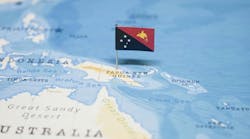Regulatory and supply uncertainties continue to plague Europe’s natural gas industry, as made clear by presentations and discussion Nov. 15 at the opening of the annual European Autumn Gas Conference in Paris.
The world’s largest market for imported natural gas has seen its security of LNG supply threatened this year by the effects of Japan’s Fukushima nuclear reactor catastrophe in March. At the same time, Europe continues to struggle to establish a dependable network of pipeline-supplied natural gas.
Overriding these logistical issues is an uncertainty over the nature and predictability of governmental regulations, mainly in terms of the region’s efforts to reduce carbon dioxide emissions. That uncertainty is only aggravated by the European Union’s current fixation on solving its sovereign debt problems.
After Japan
Among several speakers, many referred to a “post-Fukushima world,” in which Japan—already the world’s largest LNG importer—soaks up yet more LNG available from newly commissioned projects.
Europe’s nuclear power industry has been effectively derailed, as such countries as France and Germany phase out nuclear power and turn towards renewables and, reluctantly, natural gas. In this context, Europe’s natural gas industry is anxious to solidify its gas supply from all available sources.
Earlier this year, it saw the start-up of Gate LNG in the Netherlands (OGJ Online, Sept. 23, 2011), with a number of new terminals set to open in the next 18-24 months.
Acknowledging the maturation of the global LNG industry, Jean-Marie Dauger, executive vice-president for global gas and LNG, said LNG is no longer a “niche supply” source.
Pipeline supply of gas was addressed by Alasdair Cook, vice-president of BP PLC’s $20 billion Shah Deniz II development offshore the Caspian Sea. He reported that first gas will flow from the project in 2017 with 16 billion cu m/year of gas and 100,000 b/d of oil.
The pipelines to bring the gas across Azerbaijan and Georgia and initially via Turkey’s Botas existing pipeline into southern and southeastern Europe will signal the opening of Europe’s long-awaited Southern Corridor.
All speakers agreed, however, that unconventional gas, especially from shale, will not play much of a role in supplying the region if any at all. France, one noted, has banned hydraulic fracturing.
Several speakers noted uncertainties created by the regulatory environment, especially the European Union’s commitment to “decarbonization” of energy supply. Clare Spottswoode of the UK’s Independent Commission on Banking noted governments’ historical reluctance to allow markets to work.
Han-Peter Floren, a member of E.On Rhurgas’s management board, pointed out that gas supply in the medium term appeared ample but, because of regulatory uncertainties, uncertain in the long term.
In this context, many speakers said, development of transportation infrastructure is vital, yet financing remains scare and expensive. Complicating the future is the worsening economic crisis in Europe that undermines energy demand in traditional growth markets. For private investors, the climate is discouraging.
Contact Warren R. True at [email protected].
